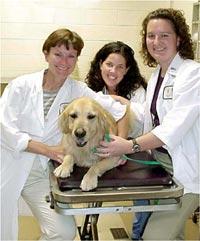The Comparative Oncology Program (COP) conducts research to better understand the biology of cancer and improve the assessment of novel treatments for humans by treating pet dogs with naturally occurring cancer. These patients receive cutting-edge care and access to clinical trials that evaluate new treatment options for cancer. Results from these studies support further development of human clinical trials and are leading the way in the fight against cancer in humans and their pets.
The COP designs and conducts clinical trials in collaboration with academic veterinary institutions across the United States. Centrally managed by COP, this network is called the Comparative Oncology Trials Consortium (COTC). Pet animals with naturally occurring cancers that are enrolled in COTC studies are treated by board-certified veterinary oncologists who share our goal of alleviating the suffering of companion animals with cancer.
Through these trials, COP and COTC researchers gather crucial information on treatment response, toxicity, pharmacokinetics, pharmacodynamics, dose, regimen, schedule, biomarkers of response and responding histologies that applies to and will benefit both animals and humans with cancers.
The COP provides opportunities for collaboration, interaction and knowledge-sharing between comparative oncologists and the cancer research community.
What is Comparative Oncology?
Pet animals with naturally occurring cancers are traditionally treated by veterinary oncologists in private practices or at veterinary teaching hospitals, using therapies similar to those used in humans, including surgery, chemotherapy, radiation therapy and cell therapy.
Of the approximately 89.7 million dogs and 73.8 million cats in the United States, roughly 6 million dogs and a similar number of cats are diagnosed with new cancers each year.
Comparative oncology is the study of these cancers to better understand and treat cancer in animals and humans. Cancers in dogs and cats are understudied and share many features with human cancers such as osteosarcoma, prostate and breast cancers, non-Hodgkin lymphoma, melanoma, soft tissue sarcoma, head and neck carcinoma, and virally induced lymphomas (see Information on Common Cancers in Dogs).
The field brings together the work of veterinary clinical oncologists with medical oncologists, the pharmaceutical industry and academic centers involved in cancer research to study these cancers. The product of this effort is an improved understanding of the biology of cancer and improved treatment options for both animals and humans afflicted with cancer.
For decades, veterinary oncologists and other cancer researchers have long recognized the value of studying these naturally occurring cancers to better understand and manage cancer in general. More than 30 years ago, researchers began improving bone marrow transplantation methods in pet dogs with lymphoma.
Today, comparative oncology helps researchers:
- Understand how the environment affects cancer risk
- Examine genetic factors that may make some dog breeds more likely to develop cancer
- Develop and optimize novel cancer and gene imaging systems
- Evaluate novel treatment strategies for a variety of cancers
- Strengthen genomic research on cancer through real-world data
